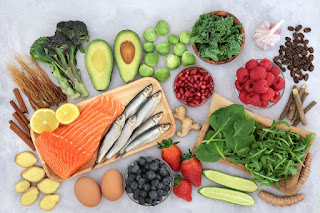Healthy eating can begin to reduce inflammation overnight. Here is what you need to know.
Healthy inflammation is the result of an active immune system defending the body against an invading enemy, such as a microbe, plant pollen, or chemical. However, many of us suffer from chronic inflammation, which is linked to diseases such as cancer, heart disease, diabetes, arthritis, depression, and Alzheimer’s. Instead of running to your doctor to get a pill to fight off inflammation, a better solution likely lies in your kitchen pantry and fridge.
"Many experimental studies have shown that components of foods or beverages may have anti-inflammatory effects," says Dr. Frank Hu, professor of nutrition and epidemiology in the Department of Nutrition at the Harvard School of Public Health.
By choosing anti-inflammatory foods, you may be able to greatly reduce your risk of many health conditions. "Some of the foods that have been associated with an increased risk for chronic diseases such as type 2 diabetes and heart disease are also associated with excess inflammation," Dr. Hu says. "It's not surprising, since inflammation is an important underlying mechanism for the development of these diseases.”
Another factor to consider is that inflammatory foods contribute to weight gain, which is also linked to inflammation. But even after obesity is taken into account, many studies show that the link between poor food choices and inflammation persists. "Some of the food components or ingredients may have independent effects on inflammation over and above increased caloric intake," Dr. Hu says.
Worst Foods for Inflammation
You guessed it: some of the foods that appeal to our taste buds most are actually the worst for us. But if you kick them off the menu, your body will thank you for it.
|
Now that you know what not to eat, we should explore ways to lessen inflammation in a matter of hours. Yes, you can reduce inflammation in just a single day. Start making small changes in your diet and other lifestyle practices to steadily reap health benefits. Here are some food tips to help reduce inflammation:
Eat a salad every day. Leafy greens contain antioxidants and bioactive compounds that tamp down inflammation and reduce potentially dangerous free radicals. Kale, arugula, spinach, lettuce are great options that will do the trick. Aim to eat a cupful every day.
Best Foods to Fight Inflammation
These antioxidant-rich foods can reduce your risk of illness:
Avocados
Berries
Broccoli
Cherries
Dark Chocolate
Extra Virgin Olive Oil
Green Leafy Vegetables
Fatty Fish
Green Tea
Grapes
Mushrooms
Nuts
Peppers
Tomatoes
|
Skip the quick snack. It is so tempting to grab a pack of chips and a Coke at snack time, but it is best not to. It is so much better for your body to pack apple slices and peanut butter, raw veggies and hummus, or some nuts and cheese cubes. Eating these healthy snacks keeps your blood sugar at an even level and inflammation down.
Add some spice. Studies suggest that adding spices and herbs to meals decreases inflammation. These include garlic, rosemary, cinnamon, ginger, cumin, fenugreek, and turmeric.
Temporarily eliminate certain foods. You may be sensitive to alcohol, dairy, or gluten. Try cutting these foods out of your diet for a few weeks while you stabilize. Gradually add them back one at a time to see if they cause irritation.
Monitor ingredients. Be picky about what the products you eat contain, since dyes, additives, preservatives, and other ingredients may trigger inflammation. If an ingredient is listed that you do not recognize, either do some research or opt for a substitute.
Go beyond your diet. Eating better is key to reducing inflammation, but there are other factors to examine and address. Dealing with stress is one. Try yoga, meditation, or going for a walk for some relief. Exercise is important for overall health, and that is true of reducing inflammation as well.
Sources:
Blog posting provided by Society of Certified Senior Advisors

